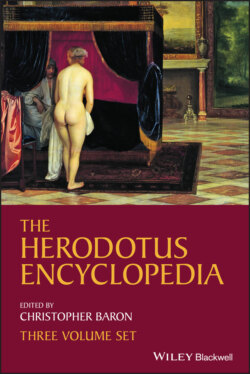Читать книгу The Herodotus Encyclopedia - Группа авторов - Страница 1025
BRIBERY
ОглавлениеMATTHEW A. SEARS
University of New Brunswick
Bribery features prominently in several episodes of Herodotus’ Histories. Persian GOLD was seen by the Greeks of Herodotus’ own day as having a potentially devastating effect on Greek unity, and the ADVISERS of the Persian general MARDONIUS are portrayed recommending bribery as a means to defeat the Greeks without the need for a battle. The Persians, however, do not seem to have used bribes to any effect during the invasion of Greece in 480 BCE (Flower and Marincola 2002, 104). The Greeks, on the other hand, offered and accepted bribes on several occasions, and once or twice even the Delphic ORACLE was corrupted.
Before the Battle of PLATAEA in 479, Mardonius was advised to send MONEY to the leading men in Greece, in order to break up the Greek coalition without risking another defeat, as had happened at SALAMIS the previous year. The Thebans first made this suggestion (9.2), and their advice was later echoed by the high‐ranking Persian ARTABAZUS SON OF PHARNACES (9.41). Herodotus portrays Mardonius as foolishly disregarding this sensible course of action out of a DESIRE to seize ATHENS a second time and to defeat the Greeks on the battlefield. Herodotus does, though, suggest that the Athenian councilor LYCIDES, who recommended that the Persian terms be presented to the Athenian people before he was stoned to death, might have been influenced by a Persian bribe (9.5).
Rather than the Persians, stereotyped as obsessed with money, it was the Greeks who usually offered and were influenced by bribes in Herodotus’ account. The Spartan king LEOTYCHIDES II was bribed during a campaign in THESSALY, after which he was banished and his house destroyed (6.72). This story accords with the Spartan fear that their leaders were liable to be corrupted if they strayed too far from home. The Athenian THEMISTOCLES is said to have served as an agent of the Euboeans to bribe the other Greeks to fight the Persians at ARTEMISIUM, and Themistocles himself kept a sizable cut of the Euboeans’ money (8.4). Most scholars discredit this story (Wallace 1974), though it does reveal that the Greeks considered themselves to be susceptible to bribery.
There are allegations that the Delphic Oracle was successfully bribed. The ALCMEONIDAE of Athens are said to have bribed the PYTHIA to tell the Spartans—no matter what question they asked—to liberate Athens from the Peisistratid tyranny (5.63). THUCYDIDES tells of another case of bribing the oracle, this time at the hands of the Spartan king Pleistoanax (5.16.2). Most scholars think these two cases are the rare exception that proves the rule, that the Delphic Oracle was generally trustworthy and that the Greeks tended not even to attempt to corrupt it (Bowden 2005, 28; Hornblower 1996, 465–66).
SEE ALSO: Cobon; Medize; Treachery; Wealth and Poverty
